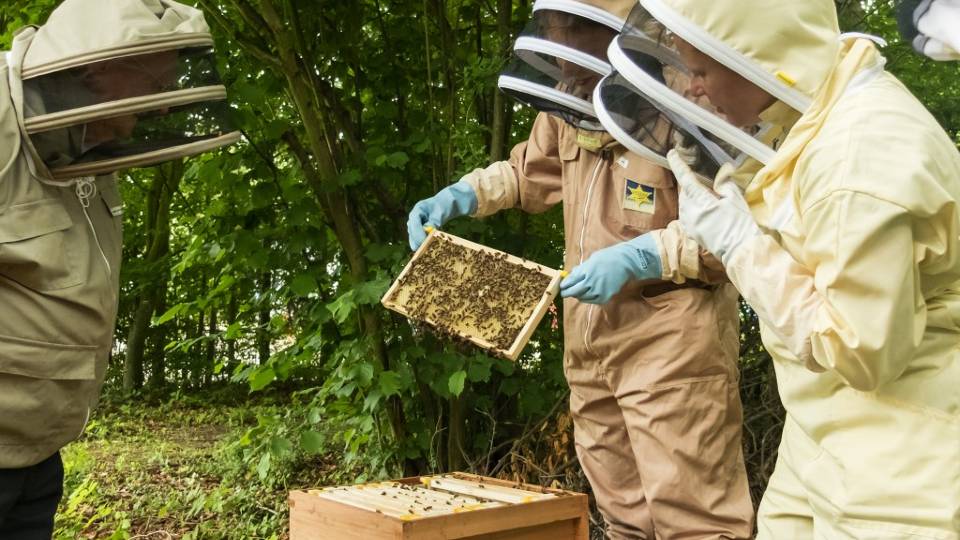Bees are a welcome inhabitant of the University campus helping to pollinate the fruit, nut trees and edible plants along the foot and cycle paths belonging to our campus Fruit Routes installation.
The University Apiary is home to between 6 and 10 colonies of honeybees. The project is funded by the University Estates and Facilities Management Service, in line with the Biodiversity Action Plan. Our Biodiversity Action Plan, and associated work we do supports the University’s Strategic Theme of Climate Change and Net Zero.
Maintaining the University Apiary helps with the survival of the campus green spaces, by pollinating perennials, trees, bulbs and keeping wider species and habitats healthy. In return, the campus offers year-round forage for the bees.
If enough honey is produced each year, then a harvest is undertaken by the volunteers and a sale of the honey is held through the Creative and Print Online Shop.
In addition to the University Apiary, biodiversity work by the Gardens Team on campus includes planting wildflowers to support all pollinators, including bees, bats, moths, ants, and butterflies, and our development of no-mow areas so that they become wildflower rich in the future.
The primary aim of the apiary is to support the declining bee populations and ensure the health and wellbeing of the bees in our care. The recent European Red List for Bees reports that almost one in ten species of wild bee face extinction.
The Sustainability Team are currently looking for volunteers to help with the management of the bees.
Apiary Supervisors
This role is open to volunteers who have completed one year of volunteering and have undergone formal training. Supervisors will initially support the Apiary Manager, but once they have demonstrated the practical application of the training, they may be required to lead inspections in the absence of the Apiary Manager.
The University will pay for the formal training and annual bee registration will also be funded if the volunteer only works with the campus bees. Apiary Supervisors are expected to support a minimum of two inspections per month during the peak season, from May to October.
Apiary Volunteers
This role is open to anyone who would like to support the trained supervisors and managers. Ideally, volunteers will attend two inspections per month during the peak season which take roughly two hours, but this is voluntary.
All volunteers will have access to University PPE free of charge. Volunteers are rewarded with honey from that extracted at the end of the season proportionate to the support contributed and the volume of honey harvested.
If you would like to learn more about volunteering at the University Apiary, please email environment@lboro.ac.uk.
Why not celebrate World Bee Day on 20 May by following the below three tips to make your space pollinator friendly:
- Planting pollinator friendly seasonal plants, lavender is a great summer choice
- Help bats by reducing or removing artificial lighting from your garden and around your property
- Let things grow a little wild in your space
You can learn more about pollinators from the Wildlife Trust and claim your ‘Wild Bee Action Pack’ to get your garden buzzing.
World Bee Day is in support of the United Nations' Sustainable Development Goals.










